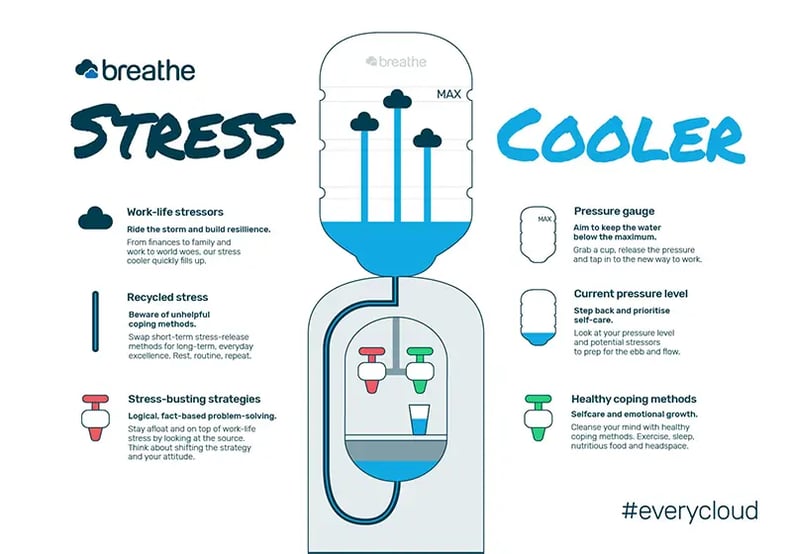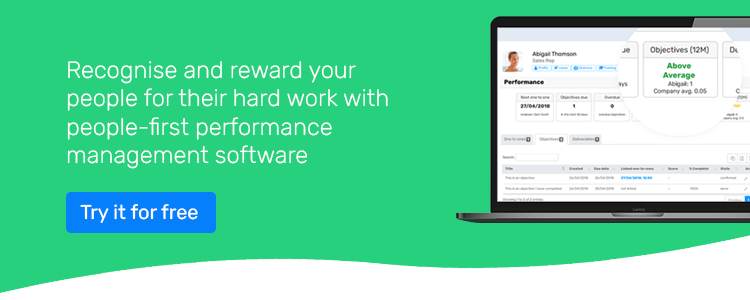Managing stress in the workplace is important for both your team and the business.
When stress at work becomes too much, it can have serious repercussions on both the employee and the business.
And it's more serious than we may realise: workplace stress reportedly costs the UK economy a massive £28 billion a year.
As an employer, you have a duty of care to look after your people's mental health. This means you must do all you reasonably can to support health, safety and wellbeing - and this includes stress levels.
But it doesn't stop here: putting things in place to reduce stress has business-benefits, too. Managing workplace-stress been shown to boost productivity, boost performance, minimise conflict and - ultimately - build a happier and healthier workforce.
But first, it's important to understand the severity of workplace stress in UK workforces. In this article, we delve into what the causes of workplace stress are, and as the employer, what you can do to protect your team from stress.
We've also collated some top statistics on workplace stress- and we're sure they'll leave you stunned.
How common is workplace stress?
What are the causes of stress at work?
7 mind-blowing workplace stress statistics
How do you know if an employee is stressed?
How to prevent workplace stress and support employees
Business benefits of tackling stress
Tips to alleviate stress at work
What is workplace stress?
Workplace stress is different to just having a lot on your plate. In fact, it can be extremely harmful if it isn't nipped in the bud early on.
Whilst a certain amount of pressure at work motivates us and helps us to be productive, excessive amounts of pressure can become overwhelming and lead to stress.
The HSE describe workplace stress as:
"The adverse reaction people have to excessive pressures or other types of demands placed on them".
Workplace stress can lead to mental health conditions such as anxiety and depression. It also effects our immune system and can significantly increase the risk of serious health conditions like heart disease.

How common is workplace stress?
Workplace stress is becoming increasingly common - and increasingly serious.
A study by Perkbox found that, of British adults in employment, a staggering 79% commonly experience work-related stress.
The research also found that work is the biggest cause of stress across the UK. This comes above money worries, relationship stress and health concerns.
What are the causes of workplace stress?
Stress can cause a significant dip in productivity and can be expensive if it gets out of hand.
So, it's important to be on the ball and aware of what the causes are so you're able to nip stress in the bud before it becomes a problem.
Workplace stress can be caused by:
-
Excessively high workloads and tight deadlines
-
Long working hours
-
Lack of managerial support
-
Role uncertainty
-
Workplace bullying, harassment or discrimination
-
Workplace changes
-
Boring job content
-
Insufficient workloads and underused skills
-
Lack of proper resources/equipment
-
Poor working relationships
-
Conflict with other team members
-
Bad management/leadership
-
Poor physical working environments
-
Unequal pay
-
Lack of promotional opportunities
-
7 mind-blowing workplace stress statistics
Now let's look at some juicy stats.
We've hand-picked 7 shocking statistics on workplace stress to share with you.
79% of us are often stressed at work
A survey by our friends at Perkbox revealed that, out of all British adults in employment, 75% commonly experience work-related stress.
This has increased by a worrying 20% since 2018.
12.8m working days are lost due to stress
Research by HSE found that a total of 12.8 million working days were lost in 2018-19 due to stress, depression and anxiety.
Women are more stressed
The report by HSE also highlighted that females had significantly higher rates of work-related stress, anxiety and depression.
The results shows that the rate of women suffering from work-related stress is over 25% higher than that of men.

Download Stress Cooler PDF
1 in 5 of us call in sick due to stress
Research commissioned by charity Mind found that 1 in 5 (19%) of us take a day off due to stress.
What's even more interesting is that, out of these people, a staggering 90% give a different reason for their absence.
24% of line managers believe employee wellbeing is not their responsibility
A study by professional services firm, Deloitte, revealed that only 76% of line managers believe the wellbeing of their team is their responsibility.
So that's 24% of line managers that still don't think the wellbeing of their team - including minimising stress - is in their hands.
The biggest cause of stress is workload
HSE's research also revealed that workload is the biggest cause of workplace stress, sitting at 44%.
This comes far above things like workplace bullying, violence and having lack of support.
45% say their workplace does not have anything in place to help with stress
Perkbox's in-depth report from 2018 also showed that almost half (45%) of UK workers say there is nothing in place to alleviate workplace stress and support mental wellbeing.
How do you know if an employee is stressed?
As with all mental health issues, it can often be tricky to spot the signs of someone suffering from stress.
Some signs of workplace stress include:
-
Loss of interest in work
-
Reduced quality of work
-
Loss of sense of humour
-
Increased sickness absence
-
Poor time-keeping
-
Tiredness and irritability
-
Physical illness i.e. nausea, aches, pains and headaches
How to prevent workplace stress and support employees
A certain amount of stress at work is inevitable, and can even be beneficial.
Stress also affects different people in different ways. But what can you do when work-related stress starts to affect how your employees cope?
Look out for the signs of stress in your teams. Is performance deteriorating? Are your employees losing interest in their work? Is sickness absence on the rise? Are you noticing tiredness and irritability?
These are all signs that there is potentially something wrong in the workplace.
So, as an employer, what steps can you take to minimise the risk of stress in your workplace? Here are our 5 top-tips.
1. Establish a wellbeing at work policy
Encourage a healthy lifestyle by including a discounted gym membership as part of the employee benefits package you offer. You can also provide a fruit bowl for your team to enjoy throughout the day.
Provide ergonomic workstations to support good posture, make an effort to create a comfortable working environment and encourage staff to take short breaks and a lunch break away from their desk.
Here at Breathe, our Headspace Team is on a mission to ensure our people are taking regular breaks. This could be a 5 minute walk, a stroll to the kitchen to make a coffee and have a chat with colleagues. Our team can also head over to our breakout space to read a magazine, listen to music or do a puzzle.
2. Lead by example
As a leader, manager or employer, it's crucial you set the tone for the rest of your staff.
Take a lunch break and mingle with your teams, even if it’s just a short one.
Give yourself a de-stress routine. Book holidays rather than forfeit them. Keep a lid on your emotions and try not to let your own stresses rub off on staff.
3. Provide a break-out area
If you really want staff to take breaks, you need to provide a quiet space for them to be able to relax. This needs to be a space separate from the working environment where employees can chill out, get some headspace and socialise.
Some popular features of a break-out area include magazine subscriptions, books, music, pool/football tables and food/drink facilities.
4. Communicate effectively with employees
Always keep your employees up to date with changes. Lack of communication will only create a feeling of uncertainty, especially when it comes to job roles.
Open communication and reassurance is essential if you want to keep stress levels to a minimum.
5. Organise team building activities and social events
Your staff spend a lot of time with each other, so it's crucial that they get along. Team building days and social activities will help your employees develop stronger bonds.
Here are some great examples of fun team-building activities that your whole team will enjoy.
Business benefits of tackling stress
So, stress at work can be serious and can cause a team-member's health to take a turn for the worse. So, it's the right thing to do to tackle it.
But how can actively minimising workplace stress benefit your business?
Here's how it can help:
-
Reduce staff turnover
-
Better decision-making
-
Improve working relationships
-
Boost quality of work
-
Lower sickness absence
-
Better customer service
-
Higher employee engagement
-
Happier, healthier teams
-
Improve brand reputation
-
Attract more talent when recruiting
-
Boost morale
Alleviating workplace stress
Even though these statistics are harrowing, it isn't all doom and gloom. There's plenty that can be done among SMEs to monitor and reduce workplace stress.
Here are a few handy tools to get you started:
-
Mental Health in the Workplace Guide
This downloadable guide provides 10 top-tips for supporting mental health in the workplace. A must-have for any SME.
-
Show your people that you put them first by signing the Breathe Culture Pledge.
What can my team do to minimise stress?
Whilst it's important for you as the employer to take steps to minimise stress in your workplace, it's important that your people do their bit, too.
Here's what your team can be doing to practise self-care and keep their stress levels down.
Get enough sleep
Getting your 8 hours is crucial to managing stress levels.
Lack of sleep can lead to a low mood, lack of energy and inability to concentrate all things that are linked with stress. So, getting a good night's sleep should be a top priority.
If some of your team members are struggling to drift off at night, they could try these powerful mindfulness exercises.
Exercise
If your team are feeling stressed, exercise will do wonders.
When we exercise, we release endorphins. These boost our mood, relax us and eliminate any feelings of negativity.
And this doesn't stop as soon as you finish exercising - you'll have endorphins flowing around your body after your workout, leaving you feeling great for the rest of the day.
This doesn't have to be intense or extensive exercise; even a short walk around the block helps.
Encourage your team to stay active. Including a discounted gym membership as part of their employee benefits is a good place to start.
Maintain a work-life balance
Getting that balance between your work and personal life is crucial for general wellbeing. Upset that balance and it can lead to not only stress - but depression and even burnout.
Encourage your team to always take their full lunch break and avoid checking their emails outside of their working hours. Not only will this nip stress in the bud, but research has found that you're actually more productive if you achieve a work-life balance. Who knew?
Key takeaways
Every employer is tackling the issue of workplace stress - and it isn't easy.
But whether you're the business leader, HR professional or line manager, you have the power to alleviate stress levels among your team.
Put your people first, prioritise wellbeing and lead by example. Your business may just thank you for it later.
Breathe can help you to free up time for what's important with our easy-to-use people management software. Why not trial for free, today?
.webp)
Author: Sarah Benstead
Sarah is a Product Marketing Specialist here at Breathe. Always innovating, she loves writing about product releases in an engaging & informative way. When she's not coming up with new ideas, she enjoys long walks with her dog, Clifford.





